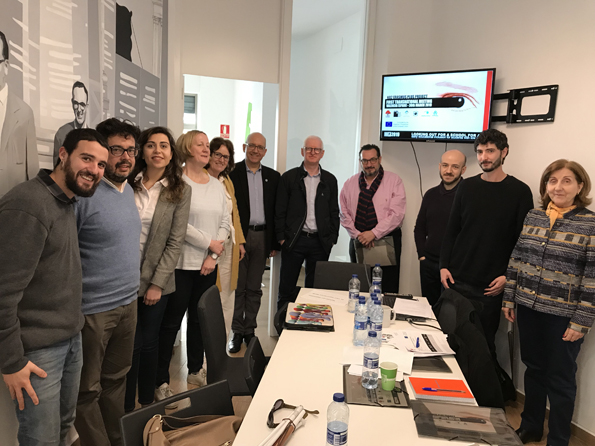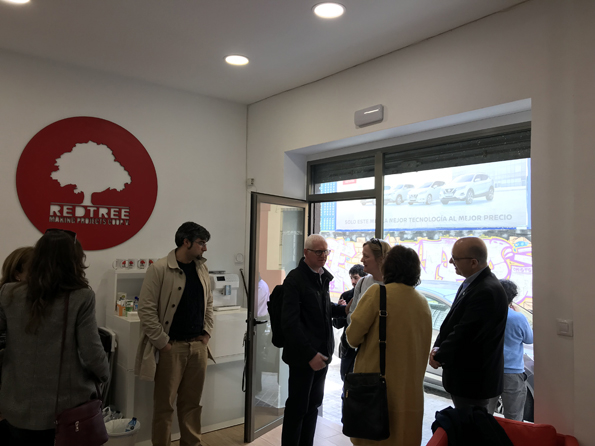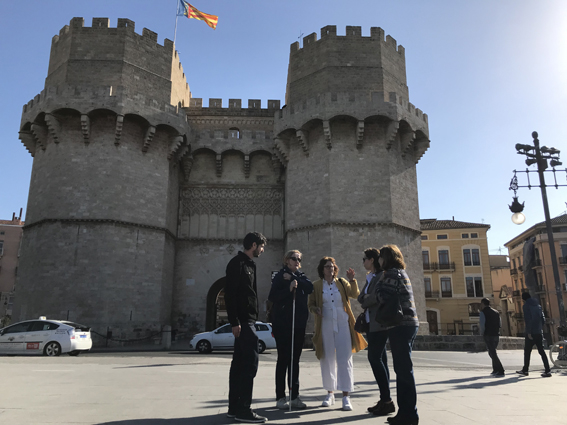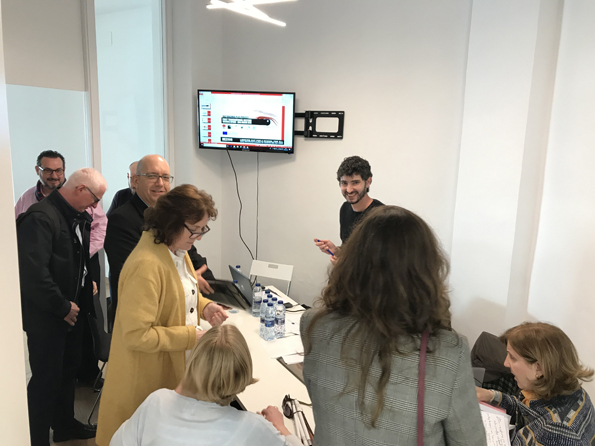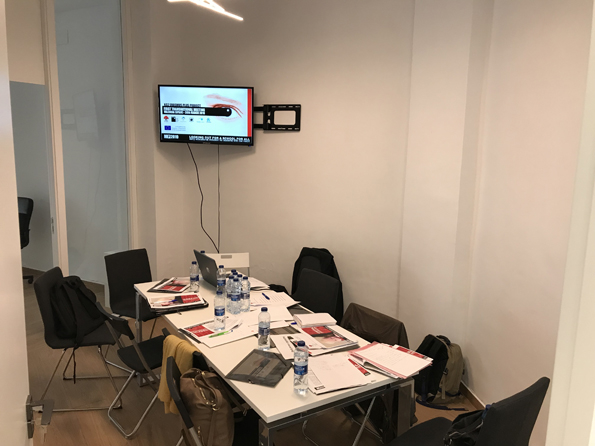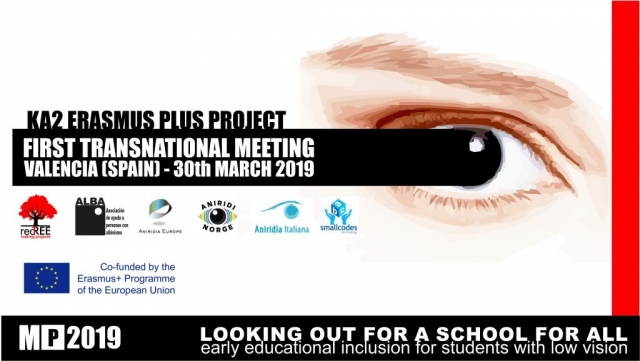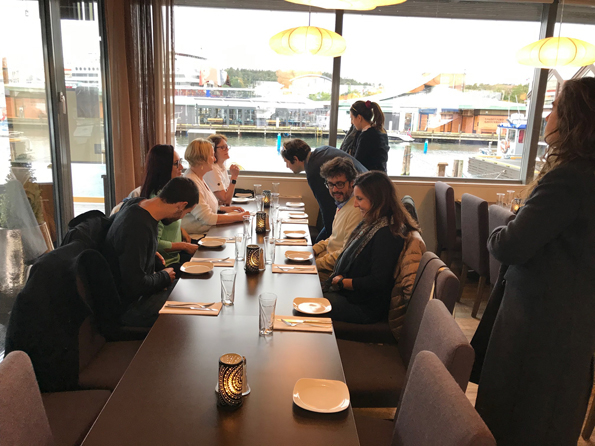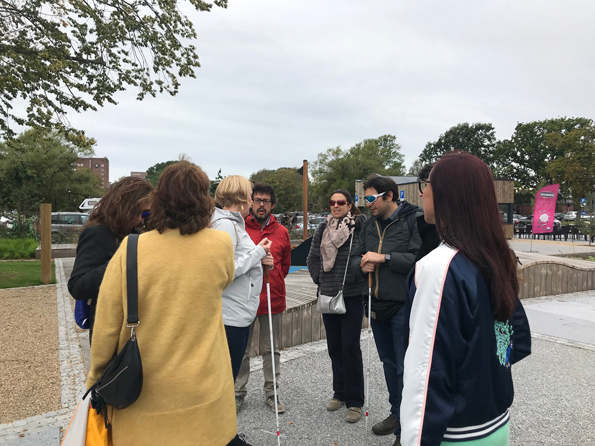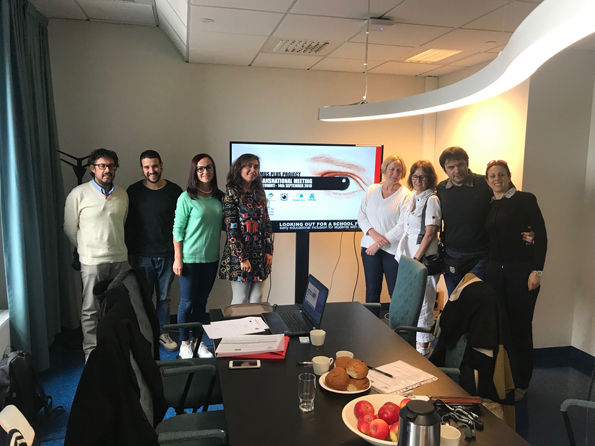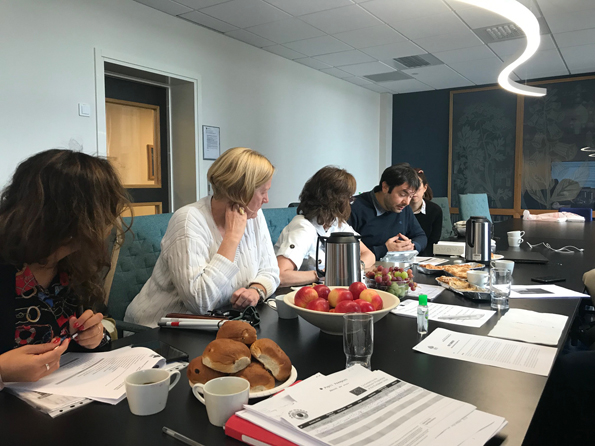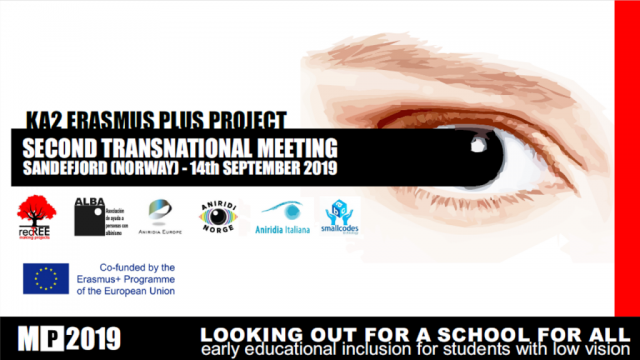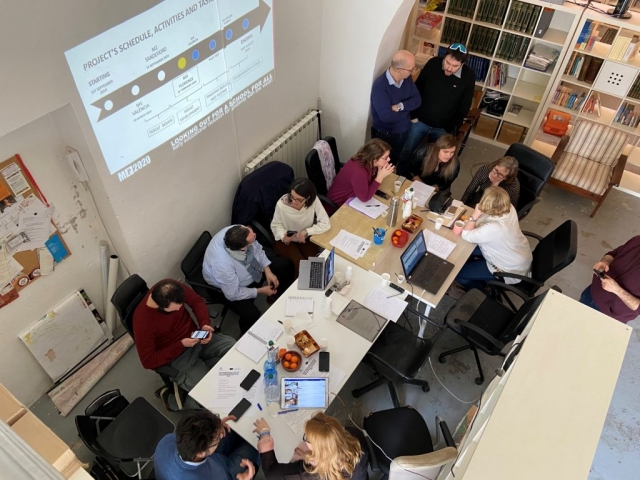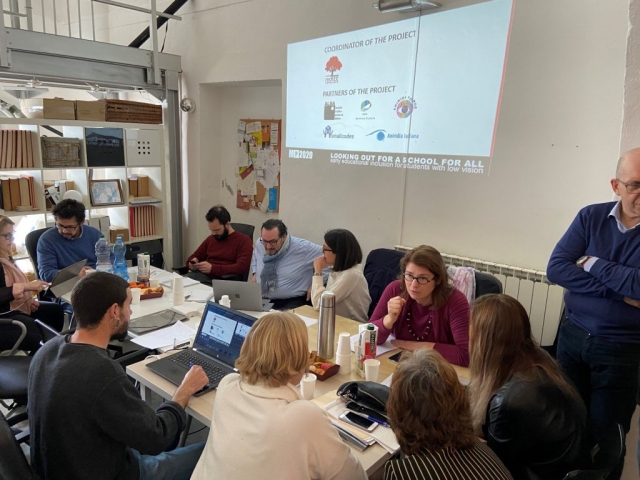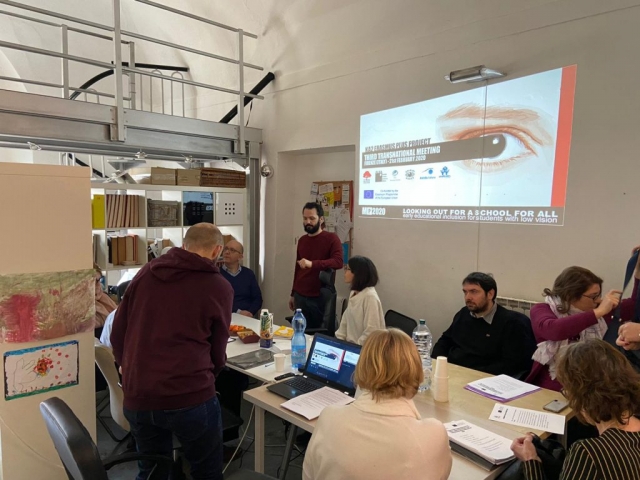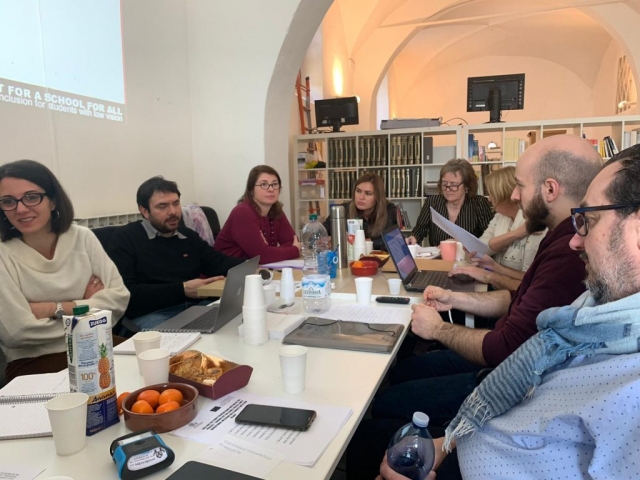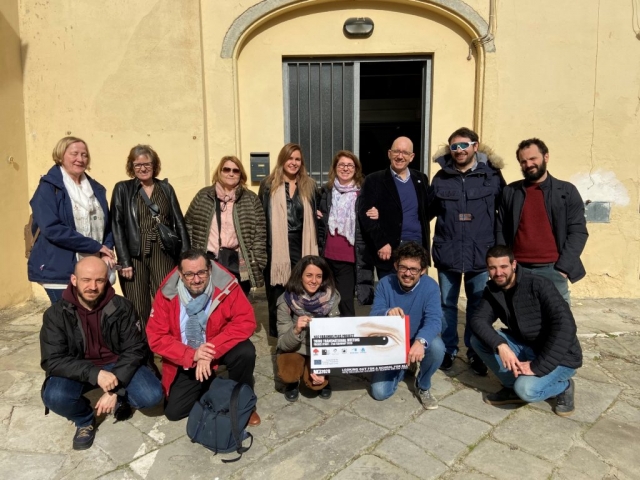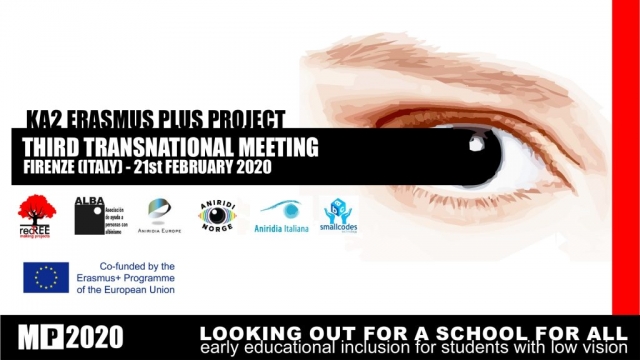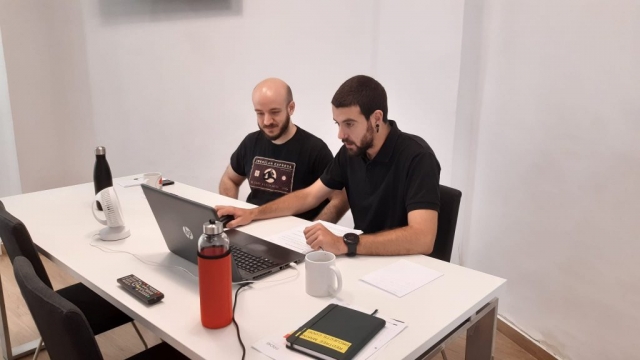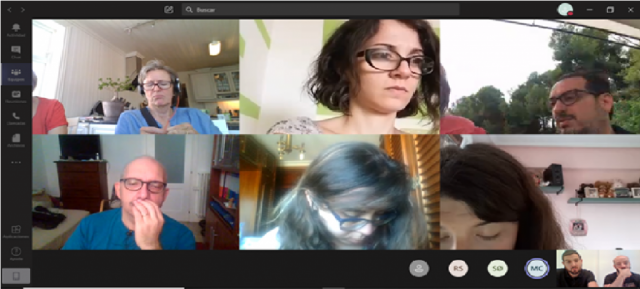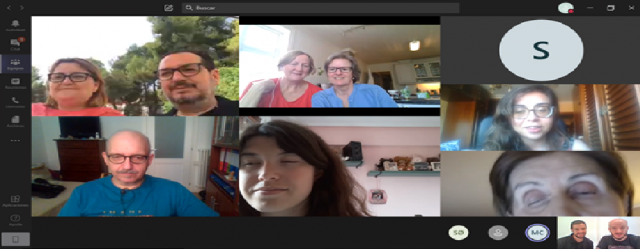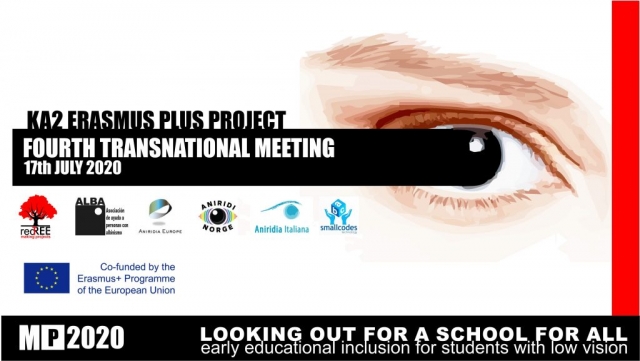ACTIVITIES IN THE IMPLEMENTATION PHASE
During the implementation phase of this project, various activities have been carried out, including:
– TRANSNATIONAL MEETINGS
– FIRST TRANSNATIONAL MEETING (M1):
It was held in Valencia (Spain) on March 30th 2019; the leaders and coordinators of the partner entities participated in it, and it was hosted by Redtree Making Projects Coop.V.
The meeting agenda focused on the following aspects:
- Introduction of the participants.
- Introduction of the project “LOOKING OUT FOR A SCHOOL FOR ALL: EARLY EDUCATIONAL INCLUSION FOR STUDENTS WITH LOW VISION”, which included:
- The Partners Agreements, which each entity signed before the meeting.
- Safety and Good Practice Plans.
- Defining the visual line of the project (logo, color guides, etc.).
- Creating the Project website.
- Present and specify the Intellectual Outputs of the project:
- O1: VIRTUAL TRAINING COURSE FOR TEACHERS AND PRE-PRIMARY EDUCATION SHCOOLS FOR THE INCLUSION OF STUDENTS WITH VISUAL DISABILITIES IN THEIR CLASSROOMS.
- O2: EDUCATIONAL SOFTWARE: ICT TOOL FOR THE INCLUSION OF STUDENTS WITH VISUAL DISABILITIES IN THE CLASSROOMS.
- Establish the schedule, activities, and tasks of the project to be carried out.
- An on-site evaluation of the previous meeting / phase.
The documents drafted for this meeting were: its agenda, a project summary, power point presentations of the project and its results by Redtree and ALBA (as coordinating entities of the Intellectual Outputs), a visibility dossier (including a poster of the meeting, a banner for the websites, a press release…); and supporting documentation: registration and special needs surveys, signature sheets, certificates, and a collection of documents to prove the attendance of the participants (plane tickets, etc.).
The project was showcased and its importance and impact for children with Aniridia and Albinism was highlighted. All entities come from the agreement in the existing lack of mechanisms for inclusion in such early ages.
The partner entities shared some personal experiences, how obstacles derived from visual impairment hinder their daily activities and learning, etc. This exchange of experiences contributed to enriching the project, since it is essential that the Intellectual Outputs provide a useful answer to the needs of the beneficiaries.
Regarding the Intellectual Outputs:
O1 – VIRTUAL TRAINING COURSE FOR TEACHERS AND PRE-PRIMARY EDUCATION SHCOOLS FOR THE INCLUSION OF STUDENTS WITH VISUAL DISABILITIES IN THEIR CLASSROOMS.
Redtree presented the purpose and objectives of the course and its main features. We reminded the partners that all course materials would be available for free download and would be accessible to everyone, and that the e-learning course would be available on the virtual learning platform.
This platform was presented and we explained that it would have the following tools: internal chat, mail, file sharing, forum, and the ability to contain multiple types of files (video, sound, images, PDFs, etc.). Tasks were distributed among the partners, naming leaders for each activity, but all partners would contribute to their development and improvement.
O2 – EDUCATIONAL SOFTWARE: ICT TOOL FOR THE INCLUSION OF STUDENTS WITH VISUAL DISABILITIES IN THE CLASSROOMS.
ALBA showed the purpose and objectives of the program and its main characteristics, as coordinating entity for this output. Its main ideas were presented and there was a debate on its creation and joint definition among the partners. The structure of the platform was accepted according to the model defined by ALBA (a structure by levels).
Although it was explained that the structure is set by age, the partners also agreed on it being fully flexible. In fact, there was a debate on the age of reading learning in different countries, and a guide was decided to be incorporated for its use and good practices added to the program, to guide on how and how much to use it. Aniridia Europe pointed out the possibility of including adjustments in the application to modify brightness, contrast, background color, etc.
The schedule, activities, and tasks to be carried out were reviewed, and a communication schedule was included following the recommendations of the initial evaluation by SEPIE. Lastly, an evaluation of the transnational meeting itself and the actions carried out so far by the commissions and managers was made, with a very positive general result.
– SECOND TRANSNATIONAL MEETING (M2):
Held in Sandefjord (Norway), hosted by Anirida Norge and Aniridia Europe on September 14th 2019, with the participation of the leaders of the project’s partner organization and the persons in charge of the Intellectual Outputs. The meeting agenda focused on the following topics:
- Introduction of the project “LOOKING OUT FOR A SCHOOL FOR ALL: EARLY EDUCATIONAL INCLUSION FOR STUDENTS WITH LOW VISION” and doing an EXCHANGE OF EXPERIENCES AND KNOWLEDGE between the partner entities on educational adaptations for children.
- The progress made in the Intellectual Outputs of the project was shown:
- O1 – VIRTUAL TRAINING COURSE FOR TEACHERS AND PRE-PRIMARY EDUCATION SHCOOLS FOR THE INCLUSION OF STUDENTS WITH VISUAL DISABILITIES IN THEIR CLASSROOMS was presented and discussed regarding index and first contents.
- O2 – EDUCATIONAL SOFTWARE: ICT TOOL FOR THE INCLUSION OF STUDENTS WITH VISUAL DISABILITIES IN THE CLASSROOMS was demonstrated at the internal functioning level.
- Review and confirmation of the project schedule, upcoming meetings, activities, and tasks to be performed.
- Mid-term and on-site evaluation of the meeting.
At this meeting, each representative presented and explained the main activities, objectives, and projects of their organization, especially focusing on educational matters; progress was reviewed, and an EXCHANGE OF EXPERIENCES AND KNOWLEDGE among the partners regarding educational adaptations for children was carried out.
The progress made in the Intellectual Outputs of the project was presented:
O1 – VIRTUAL TRAINING COURSE FOR TEACHERS AND PRE-PRIMARY EDUCATION CENTERS FOR THE INCLUSION OF STUDENTS WITH VISUAL DISABILITIES IN THEIR CLASSROOMS.
For the preparation of this meeting we had an agenda, presentations of the evolution of the results by Redtree and ALBA, a task checklist, the course index, a visibility dossier with a poster of the day and press release, and supporting documentation: registration and special needs questionnaires, signature sheets, certificates and collection of documents that prove the attendance of the participants (plane tickets).
The purpose and objectives of the course were presented, as well as its main characteristics, agreed between the entities in the first transnational meeting (free download content and accessible to all, applications of new educational tools on the e-learning platform…).
From the materials developed by several of the expert entities of the project and with the work carried out by the coordinating entity of the result, a first index proposal for the course and first contents was presented, being well received by the entities.
Possible modifications, suggestions, and improvements were addressed; Aniridia Italiana insisted on focusing on certain issues such as evolutionary development in impaired visually students (cognitive, psychomotor, emotional-emotional, perceptual-sensory), individualized curricular adaptations (depending on disability parameters) visual), and the need for greater links between teachers and specialists.
A proposal by Aniridia Europe and Aniridia Italiana insisted on including in greater detail specific training for students without visual impairment, specifying the relationship with families and specialists, which was agreed to be included in the course.
Regarding inclusive classrooms, Aniridia Europe commented on the possibility of including a section with specific materials and activity models to celebrate the international day of Aniridia and Albinism.
O2 – EDUCATIONAL SOFTWARE: ICT TOOL FOR THE INCLUSION OF STUDENTS WITH VISUAL DISABILITIES IN THEIR CLASSROOMS.
A demonstration of the internal functioning of the educational software was held. ALBA presented its the purpose and objectives, as well as its most specific main characteristics defined already in the first transnational meeting, and demonstrated the operation of the different games of the software. Its structure would cover different levels of complexity, from passive reception to active student participation through the child’s interaction with the tablet or Android device.
The partners agreed on including a configuration panel, from which both the teacher or the family, can customize and adjust various functions and screen brightness, contrast, or sound. ALBA showed a sample of the sounds and music to incorporate, and explained that these were composed by people with visual disabilities. They received their approval from the partners.
The project’s schedule, upcoming meetings, activities, and tasks to be carried out were reviewed and confirmed. Among other aspects, the dates of the following meetings (M3 Italia and M4 Valencia) were set, and the final schedules of the pilot tests of the two results and multiplier events were established. Specific tasks and activities were agreed for the next transnational meeting in Italy, and the Intermediate evaluation of this second Transnational Meeting was carried out: the entities of beneficiaries valued the future results of the project very positively.
This concluded an assessment shared by the entities, like the strengthening of the alliances and trusts of the intersectorial network, insisting on the good work done to achieve the objective of training pre-primary education professionals so they can Successfully address the challenges of making their classrooms inclusive for children with visual impairment.
Redtree stated that the dissemination dossier was already prepared, which incorporates materials for the visibility of the project, with the modification incorporated in its websites and social networks. This is available in the Dropbox folder shared by the project entities and is updated according to the progress of the project.
All organizations agreed to seek among their national and European contacts networks more organizations interested in the results of the project, to improve the impact of the project.
– THIRD TRANSNATIONAL MEETING (M3):
Held in Florence (Italy), hosted by Smallcodes Srl on February 21st 2020, with the participation of the leaders of the project’s partner organization and the persons in charge of the Intellectual Outputs. The meeting agenda focused on the following topics:
- Introduction of the participants and contextualization of the project for new participants.
- Progress made in the project’s Intellectual Outputs:
- O1 – VIRTUAL TRAINING COURSE FOR TEACHERS AND PRE-PRIMARY EDUCATION CENTRES FOR THE INCLUSION OF STUDENTS WITH VISUAL IMPAIRMENT IN THEIR CLASSROOMS.
- O2 – EDUCATIONAL GAME: ICT TOOL FOR THE INCLUSION OF STUDENTS WITH VISUAL IMPAIRMENT IN THEIR CLASSROOMS.
- Review and confirmation of the project’s schedule, next meetings, activities, and tasks to be carried out. Mainly multiplier event proposals and pilot tests.
- Result of the Mid-term report and on-site evaluation of the meeting.
In this 3rd transnational meeting, the participants of the partner entities met to present and evaluate the progress made so far in the development and coordination of all the activities and results of the project, in particular on its two Intellectual Outputs.
With great participation, based on the exchange of experiences and knowledge about the adaptations and mechanisms of accessibility of resources, lines of work were established to complete their progress, paying special attention to the Intellectual Output O2: “Educational game – ICT tool for the inclusion of students with visual impairments in the classroom”.
During the meeting, the advances in the project website were presented and its structure was better defined, to layout the contents of the Intellectual Output O1: “Virtual training course for teachers and pre-primary education centers for the inclusion of students with visual impairment in their classrooms”. We also took the opportunity to review the project’s schedule, and the date and place for the next meeting, the pilot tests, and the Multiplier Events.
Lastly, an on-site evaluation of the meeting and the implementation stage was carried out.
– FOURTH TRANSNATIONAL MEETING (M4):
The fourth transnational meeting of “LOOKING OUT FOR A SCHOOL FOR ALL” project, carried out virtually on July 17th 2020, the participants of the partner entities met to present and evaluate the latest advances made in the development of the Intellectual Outputs and carry out an analysis and follow-up of the dissemination plan, due to the alterations suffered in activities and events scheduled for this stage due to COVID-19. The meeting agenda focused on the following topics:
- Reading and approval of the meeting’s agenda.
- Progress made in the project’s Intellectual Outputs:
- O1 – VIRTUAL TRAINING COURSE FOR TEACHERS AND PRE-PRIMARY EDUCATION CENTRES FOR THE INCLUSION OF STUDENTS WITH VISUAL IMPAIRMENT IN THEIR CLASSROOMS.
- O2 – EDUCATIONAL GAME: ICT TOOL FOR THE INCLUSION OF STUDENTS WITH VISUAL IMPAIRMENT IN THEIR CLASSROOMS.
- Analyzing and monitoring the Plan for Dissemination of the Results and final evaluation of the Intellectual Outputs.
- Review and confirmation of the project’s schedule and final tasks to be carried out.
- On-site evaluation of the meeting.
With great participation, and thanks to the exchange of experiences and evaluations on the situation in each of the partner countries, agreements and control mechanisms were adopted to maintain the quality and impact standards proposed for the dissemination of the project and its results.
During the meeting, an assessment of all stages was also carried out, with special attention to its results and objectives. Also, the partner entities showed great satisfaction highlighting elements such as the high impact capability in the development of the project, and the adequacy and consensus of the agreements reached.
Lastly, there was an interest in maintaining the strategic partnership created, and make the results and Intellectual Outputs of the project sustainable over time, to allow the continued development of learning processes based on inclusion.
– OTHER ACTIVITIES OF THE IMPLEMENTATION STAGE
PROCESS 4 – COMPARATIVE ANALYSIS OF RELEVANT EUROPEAN REGULATIONS.
A19- An analysis of the needs and European curricula of pre-primary education was carried out.
A20- All European laws and regulations of special interest to the Project were analyzed in depth.
PROCESS 5 – O1 INTELLECTUAL OUTPUT DEVELOPMENT.
In the process for the development of the O1, the 6 activities related to the development of this Output were already carried out.
- O1-A1.- Adaptation of the Output based on the analysis conducted in A19 and the regulations.
- O1-A2.- Definition of the objectives, contents, and context of the Course.
- O1-A3.- Development of the pedagogical basis and methodology, both of the course and of the inclusive classrooms.
- O1-A4.- Creation of the different materials that comprise the three blocks of the course.
- O1-A5.- Adaptation of the training course to the structure of the e-Learning platform.
- O1-A6.- First pilot training course for pre-primary education teachers.
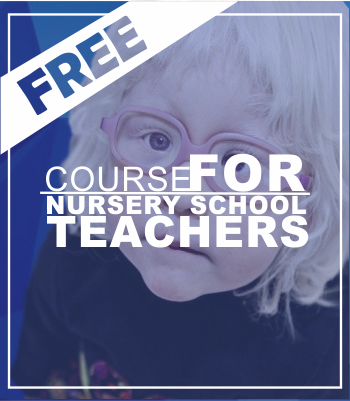
PROCESS 6 – O2 INTELLECTUAL OUTPUT DEVELOPMENT.
In the process for the development of the O2, the 7 planned activities were already carried out, the programming of the ICT resource being currently finalized, and having just received the evaluation by the teachers and pre-primary education staff, and pilot tests with the students.
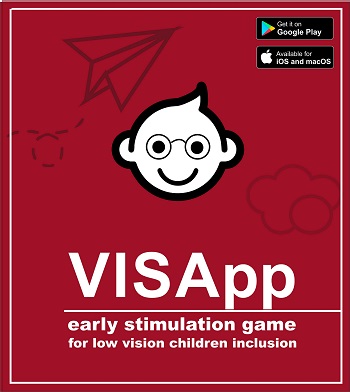
PROCESS 7 – Development of the “Methodological guide for the adaptation of a pre-primary education center”.
A21- Compilation of proposals and suggestions for the development of the guide, based on the experience of social and collaborating entities.
PROCESS 8 – COORDINATION, EVALUATION, AND MONITORING.
A22- Monthly virtual coordination meetings for the evaluation and monitoring of the activities carried out.
M1, M2, M3, and M4.- Transnational Meetings for the evaluation and monitoring of activities and processes.
PROCESS 9 – VISIBILITY OF THE PROJECT.
A23- Design of the Project image and materials for visibility and dissemination.
A24- On-site activities to present the project to other stakeholders.
A25- Activities for the online visibility of the project (www.schoolforall.eu).
METHODOLOGY OF THE IMPLEMENTATION PHASE
The methodology applied in this project was based on 3 basic pillars: to enhance an active involvement and equal participation of all partners in the development of the project’s results and activities, to ensure the highest possible quality in the results, and to boost innovation in the development of the Intellectual Outputs.
According to these criteria, a systemic planning methodology was designed capable of fully defining the project, its tasks and persons in charge, while generating a collaborative monitoring and working system that allows each member, collaborator, or participant to provide the best of themselves while learning from the strengths of others.
According to this systemic methodology, we consider that reality in general, and this project in particular, is made up of processes and sub-processes that must be analyzed in a particular way to define their whole. In order to guarantee the highest quality results possible and truly useful pedagogical materials, the project was divided into four levels:
1. Processes: the set of activities to reach an objective and/or specific result.
2. Activities: the set of events, meetings, material development sessions, etc. needed to complete a process.
3. Tasks: sets of actions necessary to carry out an activity.
4. Leaders and participants: persons in charge of carrying out the tasks.
THE PRINCE2 METHODOLOGY
This systemic methodology is based on the project management methodology PRINCE2, but adapting it to the management of European projects and specifically to this one. Unlike the traditional approach, this methodology is based on the product, so its processes were focused on obtaining specific results rather than on planning activities, making it better suited for the management of innovation projects like this one.
One of the main objectives of this methodology is to turn projects with a significant load of variability and uncertainty into controlled environments to minimize risks and facilitate its management.
This methodology covered essential aspects of the project, like quality, changes, its role structure (organization), its plans (how much, how, and when), its risks and progress, viability, and also the monitoring and continuous evaluation throughout its lifecycle.
The PRINCE2 methodology is based on the following 7 principles, useful not only for the project, but for the whole organization in which it is developed:
– A continuous justification
It ensures that there is a justifiable reason to start the project.
It remains valid throughout the project’s lifespan.
It has been identified and approved.
– Learning from experience
Previous experiences are collected, obtained throughout the execution of the project, along with the lessons learned at the end of it.
– Clearly defined roles and responsibilities
This ensures that the interests of the project’s users, partners, and its coordinator are represented in the decision making processes.
– Management by stages
Every project following this methodology is planned, monitored and controlled by stages.
– Management by exception
This means to delegate enough authority from one management level to the next, giving autonomy according to established capabilities (schedule, cost, quality, scope, benefit and/or risk) so that, if these capabilities are exceeded, the superior level is consulted on how to act.
– Result-oriented
It focuses on the definition and submission of products and results, meaning that a project is not a set of tasks to be carried out, but the submission products and results (developed after carrying out the necessary tasks).
– Adaptation
This ensures that the PRINCE2 methodology and the controls to be applied are based on the size, complexity, relevance, capabilities and risk level of the project.

